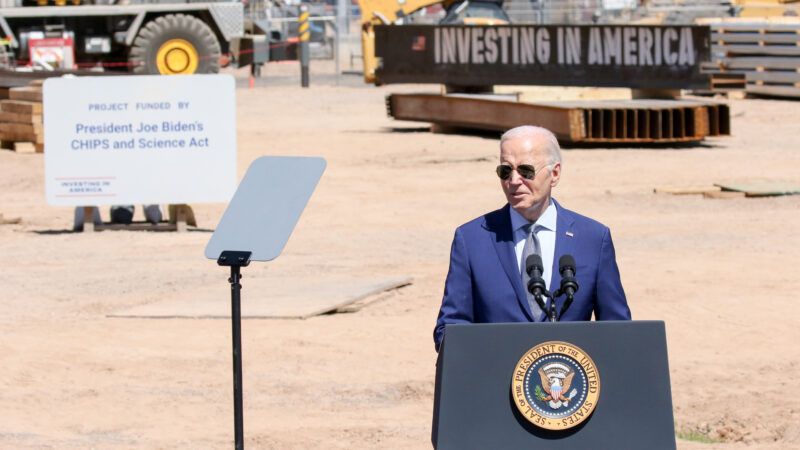Biden Rushes To Dole Out CHIPS Act Funds Before Leaving Office
The law's biggest beneficiary is Intel, which lost more than half its market value this year as competitors soared.

When a U.S. president faces the end of his term, there is often a mad dash to take care of any unfinished business. Sometimes he undertakes tasks at the last minute to avoid political blowback—for example, issuing controversial pardons—but it's typically just a matter of, lots to do and a waning amount of time in which to do it.
With just weeks left in his term, President Joe Biden's administration is hurrying to shovel as much cash out the door as possible before Donald Trump takes office in January. In the process, Biden is making a big bet on a failing company.
"Chipmaker Intel and the CHIPS Act Office are close to finalizing a deal which would award the company a roughly $8 billion grant," CNBC's Rohan Goswami wrote Monday, "as the Biden administration moves to dole out funds before President-elect Trump's inauguration."
Passed in 2022, the CHIPS and Science Act apportioned tens of billions of dollars for companies that make semiconductor chips, including $39 billion in direct manufacturing incentives. Of the allocated total, Intel was the largest beneficiary: The company announced in March that it would receive $8.5 billion in direct funds, plus a 25-percent "investment tax credit" from the U.S. Treasury Department and "eligibility for federal loans up to $11 billion."
"Nearly all manufacturing of leading-edge chips across the entire industry moved overseas to Asia years ago. That's why today's investment is such a big deal," Biden said at the time from Intel's campus in Chandler, Arizona. "It's going to transform the semiconductor industry."
But a bet on Intel is far from a sure thing.
The company was long a dominant force in computing, and its success was seen as a given. "While the increase in chip processing power is an engineering marvel, the increase in Intel's market value has been an equivalent financial marvel," the Harvard Business Review wrote in 1996. "A $1,000 investment in Intel stock made in the days of the IBM PC and the Intel 8086 chip would be worth more than $30,000 today." The company owned the market for PC microprocessors throughout the 1990s, and then in 2005, Apple announced that it would begin using Intel microprocessors in its computers as well.
But nothing lasts forever, including market domination. In 2007, Apple offered Intel the chance to produce chips for its then-upcoming iPhone—which Intel CEO Paul Otellini declined because he felt the company wouldn't sell enough to justify the cost. Then in 2020, Apple announced that it would switch from Intel microprocessors to its own proprietary chips.
Recently, the company has been in freefall: As of November 6, Intel was the year's worst-performing tech stock on the S&P 500 index, and the fourth worst overall, losing just over half its value as the overall index grew 24 percent. In November, rival chipmaker Nvidia replaced Intel on the Dow Jones Industrial Average.
In October, the company revealed a $16.6 billion third-quarter loss, the largest in its history. And last week, Intel announced that after laying off around half of the staff at its campus in Folsom, California, it would sell the facility outright and lease back a portion from the new owners, in an effort to further cut costs.
At the same time, Intel's competitors have soared: Nvidia briefly became the world's most valuable company in June, and AMD reported net income of $771 million in the third quarter, more than double its income for the same quarter a year earlier. (Disclosure: I own fewer than 50 shares of Nvidia stock.)
Over the weekend, The New York Times reported that the government expected to trim Intel's grant from $8.5 billion to less than $8 billion, based on the company's struggles to hit certain milestones. And yet at the same time, the government is hurrying to finalize the terms of the deal so the next administration can't take it away.
"That chip deal is so bad," Trump told Joe Rogan in an October podcast interview. "We put up billions of dollars for rich companies." (As usual, Trump is partly right but suggests the exact wrong solution: "You didn't have to put up 10 cents," he added. "You tariff it so high that they will come and build their chip companies for nothing.")
The Biden administration sold the CHIPS Act by touting the benefits the bill's funding would generate. When the law went into effect, a White House press release touted that it would "boost American semiconductor research, development, and production" and "ensure the United States maintains and advances its scientific and technological edge."
But the bill has largely given lucrative cash gifts to successful companies. Earlier this month, the Biden administration finalized a $6.6 billion grant for Taiwan Semiconductor Manufacturing Company—a company which, as of this writing, has a market capitalization of nearly $960 billion. The only exception is Intel, a company struggling to survive as its industry is thriving.
"We are disappointed by how long and how slow the dispensing of funds has been," Intel CEO Pat Gelsinger told Bloomberg last month. What's disappointing is that the government has inserted itself into the business of influencing wealthy companies' financial decisions with multi-billion-dollar giveaways of taxpayer money.


Show Comments (9)